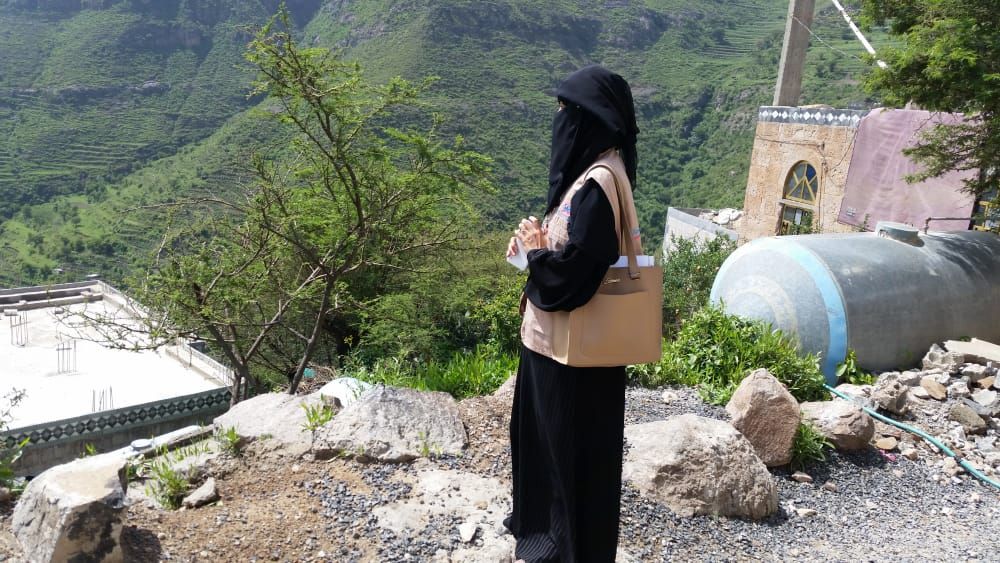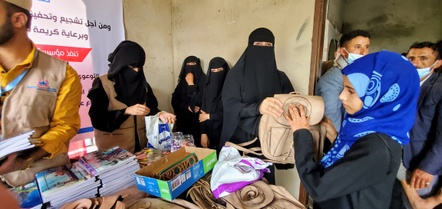My name is Faizah Ahmed Al-Zabidi, and I hail from Jiblah, a district in Ibb governorate, where I was born and raised. My passion lies in serving my community and alleviating the pain and suffering of those around me, a calling born from my background in medical labs.
I will never forget the day I visited Munawar village with my colleagues from the al-Shima'a Foundation for Development . I witnessed a travesty: girls as young as 12 years old struggling to carry heavy water containers over treacherous mountainous roads just to provide for their families. The memory of their burdened figures stayed with me for weeks.
The problem of water scarcity was the most pressing concern in the village. It was affecting education, spreading disease, causing accidents, and much more. Before our visit, we had met with community leaders and officials to understand their needs better. We knew that solving the water problem was our top priority.

Faiza Ahmed looks at Munawar village. © Yemeni Women's Voices Platform
Girls struggling to carry heavy water containers over treacherous mountainous roads.
The issue of water access was complex: Some villagers, who were more influential and financially stable, had easy access to water. They used plastic pipelines to channel the water from the spring and owned or rented donkeys to transport it. Meanwhile, the poorest families had to fetch water through primitive means, putting young girls and women at risk of injury and accidents.
The issue of water access was complex: Some villagers, who were more influential and financially stable, had easy access to water. They used plastic pipelines to channel the water from the spring and owned or rented donkeys to transport it. Meanwhile, the poorest families had to fetch water through primitive means, putting young girls and women at risk of injury and accidents.
Initially, I was scared to intervene. Still, my second visit to the village steeled my resolve. I worked with the Al-Shima'a Foundation to create a peaceful solution based on equal access to resources for all members of society.

One of the periodic meetings of al-Shimaa' Foundation for Development with the people of Munawar village.
© Yemeni Women's Voices Platform
Together, we educated the influential villagers on the importance of community cohesion. We spoke to them with the language of love, using Qur'anic verses to stir their conscience and convince them to prioritize public interest. As they came face to face with the suffering of their neighbours, their hearts opened to finding solutions that fulfil the needs of everyone.
Our efforts resulted in a reconciliation agreement that ensured equal and fair water distribution among all villagers. With our support, the village received a 1-kilometre pipeline and a large water tank. This changed the lives of the villagers, especially the young girls who no longer had to travel far to fetch water in the scorching sun.
Our work didn't stop there; we also encouraged the girls to return to school by distributing school bags, which significantly impacted their education. The new water source brought peace to the community, as every member could access water safely and easily.
We spoke with the language of love, using Qur'anic verses.
The first time the villagers gathered around the water tank was a moment of pure joy and happiness. The children chanted, and the adults clapped and ululated in celebration. It was a day I will never forget, a day where I witnessed the power of volunteerism and its impact on people's lives.
Voluntary community work is an essential part of what makes us human. It gives us a sense of purpose and fulfilment, and it has the power to change the world. Despite the challenges I faced during this project, the smile on the faces of the villagers made it all worth it. Volunteerism is an act of pure generosity, and on December 5th, International Volunteer Day, the world comes together to celebrate it.
As I pen these words, my mind drifts to the plight of the young girls in Munawar village, who once struggled beneath the weight of jerry cans far too heavy for their delicate frames, braving the risks and terrors of their daily journeys to fetch water. But now, I see them differently. They sit in their classrooms, dressed in crisp school uniforms, their pens scratching across pages as they absorb knowledge.
Distribution of school bags by al-Shimaa' Foundation to the students of Munawar. © Yemeni Women's Voices Platform

The mothers, once bent under the strain of heavy loads on their heads, now stand tall, free from the burden that once caused them so much pain and even cost them their unborn children.
Gathered around the water tank, their laughter echoes, their memories of hardships are now distant. They share stories of their past, but there is a lightness in their eyes, a resilience that shines through their joy.